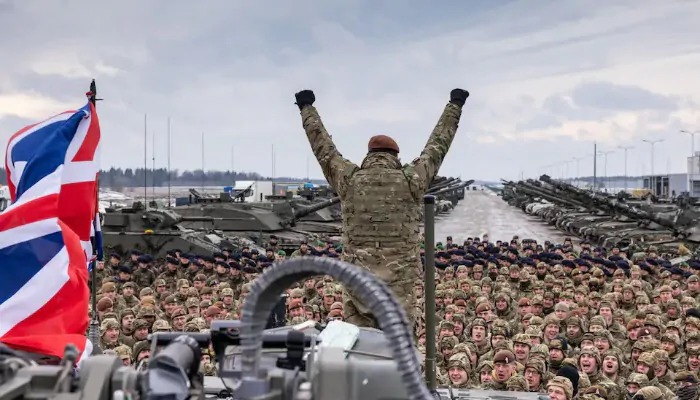
The Activities of English Peacekeeping Forces in Lori and the U.S. Mandate for Armenia as a Security Guarantee: Lessons From the Past: Part 3
Genesis Armenia think tank/foundation has published the third part of an article by Candidate of Political Sciences Abraham Gasparyan and Historian Armen Sargsyan, titled “The Activities of English Peacekeeping Forces in Lori and the U.S. Mandate for Armenia as a Security Guarantee: Lessons From the Past” (Part 1, Part 2). The article is presented below:
Part Three
In the summer of 1918, following the Turkish invasion of the South Caucasus, the Georgian-German united forces entered Lori Province—on a temporary basis—under the pretext of protecting Tbilisi from the Turks. However, when Turkey was defeated in World War I and its troops retreated from Armenia with the joint forces of Armenians and the English—leaving Kars as well—Georgians refused to leave Lori.
The Republic of Armenia made several diplomatic attempts to resolve the issue with Georgia, but all efforts were in vain. On Dec. 13, 1918, the Armenian army, under the command of Dro, launched an offensive and captured over forty villages in Lori, including Sadakhlo. In fact, the road to Tbilisi was open, as the Georgian army had been completely defeated and was unable to resist. To remind, the Georgian army operated with the support of the German garrisons established in the South Caucasus, yet even with that support, they were unable to withstand the Armenian forces. This victorious war had significant security implications for Armenia. With the mediation of military representatives from England and France, an agreement was reached between the parties, and the war, which had lasted two weeks, was halted on Dec. 31, 1918.
By the agreement of Jan. 17, 1919, Lori was designated as a “neutral” zone under the control of British forces and led by a British governor. In fact, the British acted as mandate-holding forces in Lori. However, due to their own interests, this British mission was very short-lived, and in April 1919, they withdrew from Lori. Lori became part of the Republic of Armenia. Had the Armenian forces been defeated by the Georgians, Lori would have remained within Georgian territory. Lori’s inclusion in the Republic of Armenia was solely the result of the victorious war, similar to what later happened in Zangezur.
In summary, the peacekeeping activities of the British in Lori operated only insofar as they aligned with British interests, and they even recognized Lori as a “neutral” zone rather than a part of the Republic of Armenia.
At the same time, let us emphasize the significant role of England in the removal of Turkey from Armenia and Kars after World War I, as well as later, during the Lausanne negotiations.
The U.S. Mandate for Armenia as a security guarantee: On Jan. 30, 1918, at the initiative of U.S. President Woodrow Wilson, the Paris Peace Conference decided to liberate Armenia and designate it as a protectorate (mandate holder). Hopes for resolving the Armenian Cause were revived. It was simply necessary to fix Armenia’s borders and appoint a mandate holder for Armenia. The Armenian circles were not fundamentally opposed to candidates from England, France, or Italy, but were more inclined for the U.S. to take the mandate due to President Wilson’s pro-Armenian stance. Although the Paris Peace Conference decided to send a commission to the Middle East to examine the situation regarding the territories to be detached from the Ottoman Empire and make recommendations, in fact, only U.S. representatives were present in Turkey. After 1.5 years of work, they proposed that three states be established under a U.S. mandate: Armenia, Turkey, and Pontus.
In the summer of 1919, a new commission was sent to the Near East, led by Gen. J. Harbord. Based on rich materials, he prepared a report stating that the U.S. could assume the mandate for Armenia on the condition that Asia Minor and all of the South Caucasus would also fall under that mandate. According to him, the costs for five years should have amounted to $757 million, and the presence of an army of 59,000 was necessary to ensure Armenia’s security.
In Gen. Harbord’s report, 14 arguments were presented in favor of accepting the mandate for Armenia, while 13 were against it. On June 1, 1920, the U.S. Congress considered the issue of the Armenian mandate and rejected it with 23 votes in favor and 52 against. Thus, the U.S. did not even consider it advantageous to take on a protectorate (mandate) over Armenia. In fact, the country’s interests once again came to the fore.
At the same time, we must note that the pro-Armenian stance of the U.S. during the Paris Peace Conference and at the signing of the Treaty of Sèvres, the Arbitral Award of U.S. President Woodrow Wilson, as well as the aid provided to Armenia in 1919 were fundamental for the Armenian people and the Republic of Armenia.
To be continued


